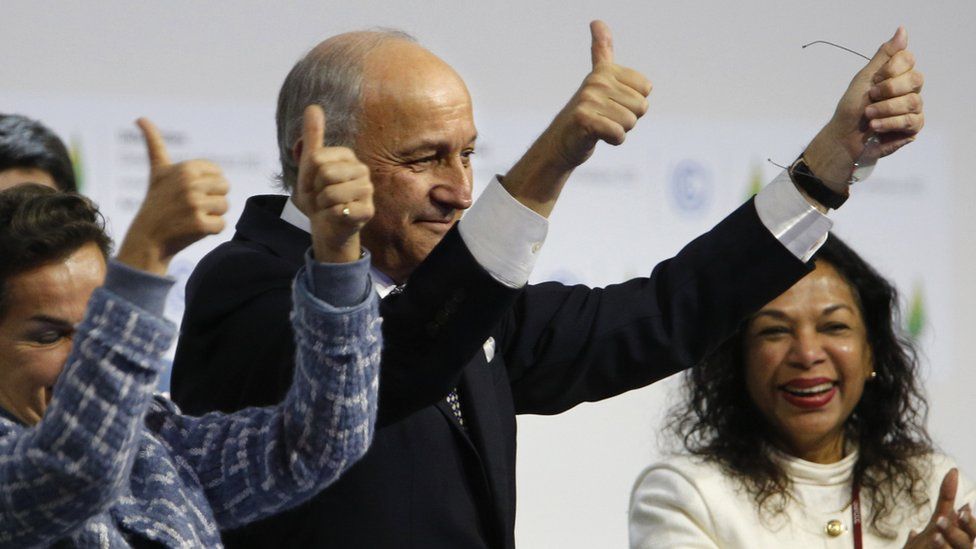'Consequences' for the US if it quits Paris climate deal
- Published

The US faces "diplomatic consequences" if a new President decides to pull out of the Paris Climate Agreement.
American climate envoy Todd Stern said the reaction would be far greater than when the US left the Kyoto Protocol under President Bush.
Many countries are worried that a Republican victory in November's presidential election would see the US walk away from the landmark Paris deal.
But Mr Stern said he thinks this is unlikely given the global reaction.
The recent decision by the US Supreme Court to stall President Obama's Clean Power Plan has raised concerns in many parts of the world that the US might not be able to live up to the carbon cutting commitments it made in the French capital in December.
Faith in the law
As US lead negotiator, Todd Stern has been visiting Europe as part of efforts to "reassure" countries that America will stick to its promises.
"We anticipate that the Clean Power Plan will be upheld," he told reporters in London.
"But if for whatever reason it is not, then we will have to use other means to get to our target, but we are not backing off our target."
As well as worries over the Supreme Court ruling on the White House plan to limit emissions, many countries are also concerned about the impact of a new Republican administration on US climate policy, something highlighted by President Obama in recent days.
"They're all denying climate change," the President said, referring to the Republican candidates seeking the party's presidential nomination.
"This is not just Mr Trump," Mr Obama continued. "There's not a single candidate in the Republican primary that thinks we should do anything about climate change, that thinks it's serious."
Mr Stern recalled that the election of President George W Bush saw the US renounce the Kyoto Protocol, the world's first, flawed attempt to limit carbon emissions.
He said that there was a clear record of what happened, and it was "diplomatically challenging" for the US.
If they reneged on Paris, he said, it would be much worse.
"There was a lot of blowback that the US got generally diplomatically across the range of diplomatic concerns and I have no doubt that it would be very significant if the US were to do that with regard to Paris, probably much, much more significant than what happened before."
"There is a record there that you can look at to have a pretty good sense that there would be diplomatic consequences."
The scale of possible repercussions would make it highly unlikely that a new President would pull out of the Paris deal, Mr Stern said.
Sign and join
UN Secretary General Ban Ki-moon has asked global leaders to come to New York in April for the official signing of the Paris agreement. To become operational, the treaty needs 55 countries representing more than 55% of global emissions sign and ratify it.
Mr Stern said that the US would sign in April and join the agreement this year.
The leaders of France, Peru and Morocco have already stated that they will attend the gathering.
French President Francois Hollande is likely to be accompanied by his minister of environment, Segolene Royal, who has taken over from Laurent Fabius as president of the climate negotiation process.
She will be in charge until the next meeting in Marrakech in November.
Follow Matt on Twitter and on Facebook.